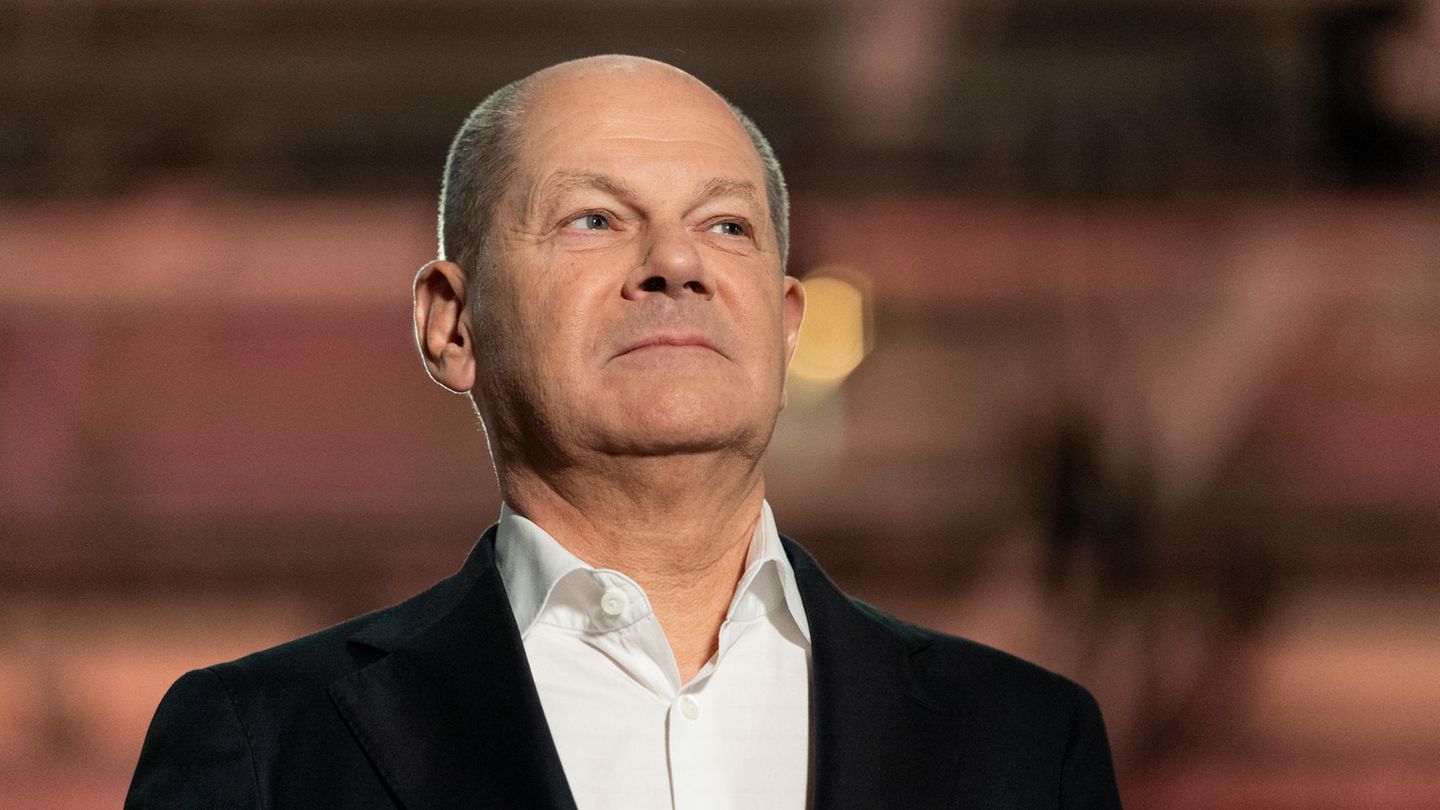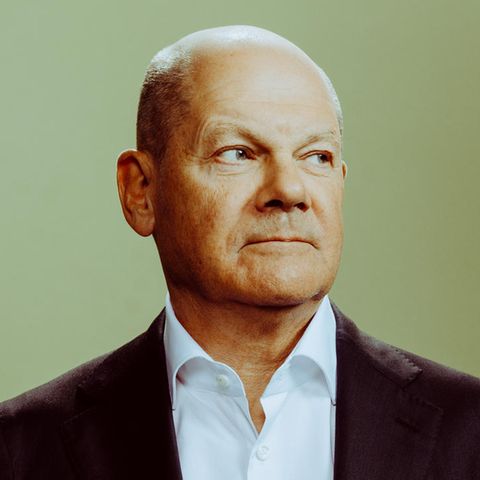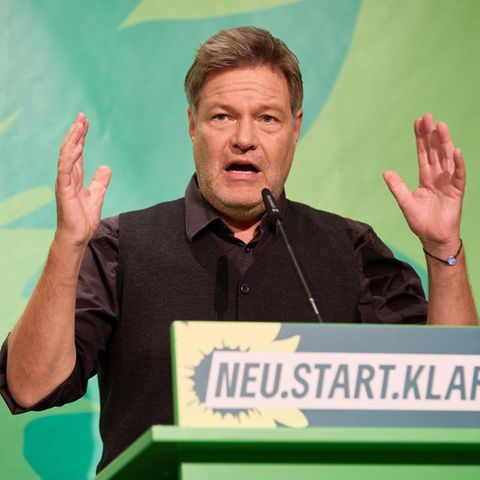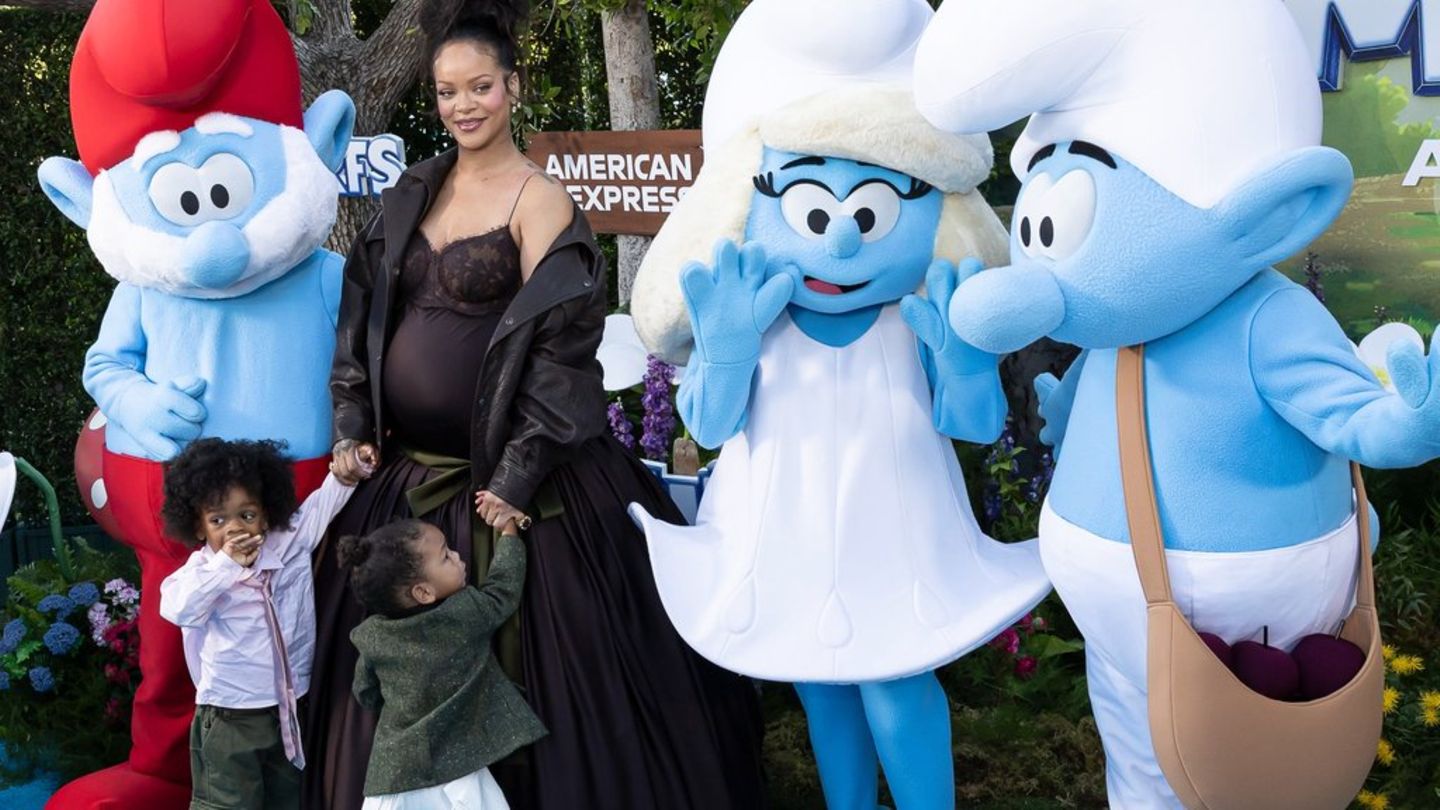SPD party conference
Olaf Scholz’s painful admission
Copy the current link
At the SPD party conference, Olaf Scholz is the full-range man and wants to be chancellor for “the normal people”. And at one moment he becomes noticeably self-critical.
When asked what she liked about the Chancellor’s speech, a comrade said almost astonished: He explained his politics. There were times when even his SPD didn’t really know what Olaf Scholz was up to. Nothing missing? Nope, maybe a bit of drive, otherwise everything was there.
In fact, the Chancellor and now the Social Democrats’ highly officially elected chancellor candidate apparently put all his energy into not leaving out any topic in his 50-minute speech at the SPD party conference on Saturday afternoon. This is apparently intended to make it accessible to as many voters as possible.
The SPD is currently polling at 14 to 16 percent and can really use every vote if it is to be spared a fiasco on February 23rd. In his party conference speech, Scholz presents himself as a full-range person, as a chancellor in five versions.
The I-am-not-Merz Chancellor
Scholz doesn’t mention the name of his biggest opponent once, calling him “the opposition leader” as if he didn’t want to unnecessarily enhance Friedrich Merz as the CDU/CSU’s candidate for chancellor. After all, the Union is almost twice as strong in the surveys as the SPD.
Scholz spends a large part of his speech working on his opponent, tapping into the contrast between himself (“clarity, prudence and experience”) and Merz (“quick sayings”, “ancient recipes”). Scholz denies the Union and its top man any coherent concept for the future and accuses them of only making “expensive promises” and leaving a lot of things vague. “Now is not the time for politics on the backs of ordinary people,” shouts Scholz. “Or in short: Now is not the time for the CDU/CSU!”
Scholz’s strategy is clear: He wants to make the contrast with Merz as big (and sometimes rough) as possible and portray the Union candidate as incompetent for the office. Many Social Democrats also consider the focus against this “Merz CDU” to be risky and would rather see their own politics take center stage.
The Normal People Chancellor
His “respect” election campaign led Scholz to the Chancellery in 2021, and now he apparently wants to try to be a lawyer for “ordinary people”. Not the “little people”, no – that’s a bit condescending, Scholz thinks, and locates this rhetoric (hardly surprising) in the CDU, where “this disdain is pouring out of every buttonhole”. The only question is: who are these “normal people”, a target group that seems quite random? Scholz actually spells them out, it’s almost bizarre: workers, craftsmen, nursing staff, firefighters, cleaners, tenants, ventilators, employees, families, pensioners… “All of them!” shouts Scholz. And apparently means it literally.
These “ordinary people” often footed the bill for costly promises, usually for the benefit of “the upper ten thousand.” The SPD program therefore does not include any tax cuts for top earners. “If you really want that, you have to vote for the CDU. Or FDP,” emphasizes Scholz in barely concealed class struggle rhetoric. His SPD, on the other hand, relies on well-known recipes such as increasing the minimum wage to 15 euros and higher taxes for the super-rich in order to relieve the burden on lower income groups.
The “ordinary people” want to be taken seriously, says Scholz, including when it comes to climate protection. Paternalism is the wrong recipe; instead, pragmatism is required. Only then can the endeavor of climate neutrality succeed. It is clear who is meant – but Scholz does not mention the Greens or their candidate for chancellor Robert Habeck in his entire speech. Anything else would counteract his story of the duel against Merz.
The Both/And Chancellor
Scholz’s line of argument also includes that nothing should be played off against each other, such as internal and external security against the economy or health care against support for Ukraine. Scholz exposes these contradictions himself in order to then act as a bulwark against the “either-or”. The SPD has stood for this in the past three traffic light years, which Scholz describes as a “strenuous” time – he should have ended the coalition earlier, says Scholz. A slight hint of self-criticism, which the comrades promptly respond to with sustained applause. Scholz must understand the applause for his admission as a wave of the batten: Being chancellor and naming your own mistakes is also possible – not an either/or either.
The one-bit-peace chancellor
Scholz himself sums up his difficult dual role in Ukraine policy in this formula: “There is a political force in Germany that stands by Ukraine without ifs and buts – and at the same time makes sure that we are not drawn into this war.” In other words: unconditional support – but not too much.
A duality that is also intended to address peace advocates in the country and the party, but has already driven a number of disappointed Social Democrats into the arms of Sahra Wagenknecht. The Chancellor wants to position himself as an active supporter of the country attacked by Russia, who will keep a cool head in all escalations and at the same time work towards “real” peace negotiations that are “fair” for Ukraine. “I will remain steadfast and prudent,” Scholz promises, and everyone can rely on that.
Bracket: Not with a Friedrich Merz. In Scholz’s eyes, the fact that he gave the “nuclear power Russia” an “ultimatum” in the Bundestag and then no longer meant it showed neither stability nor prudence. “Such capers do not do justice to the responsibility that comes with running for the office of Chancellor.”
The Can-It Chancellor
Dramatic things would happen in these weeks, all over the world, but also “right on our doorstep,” Scholz begins his speech in a dark intonation, setting the tone for the following 50 minutes. Austria will soon have a “clearly” right-wing chancellor, Russia’s hybrid warfare is also threatening security in Germany and, in general, times are “damn serious” and “excessive.”
Scholz wants to present himself as a stability factor in this situation, as an experienced statesman with whom there would be no daring experiments in domestic or foreign policy and as a chancellor who, despite everything, has still limited irregular migration or averted the gas crisis. It would hardly have been surprising if Scholz had said, following his predecessor Angela Merkel: You know me. But the surveys show that this is a certain obstacle for many voters. As the (now former) traffic light chancellor, Scholz also represents the status quo.
The unpopular Scholz is aware of his party’s unfortunate starting position and admits that it is not easy. “But I also know that winter election campaigns can end well.” In Hamburg he stood for election twice in February and “clearly won twice,” says Scholz. That’s encouraging, says the Chancellor. But whether that’s enough will be seen on February 23rd.
Source: Stern
I have been working in the news industry for over 6 years, first as a reporter and now as an editor. I have covered politics extensively, and my work has appeared in major newspapers and online news outlets around the world. In addition to my writing, I also contribute regularly to 24 Hours World.






